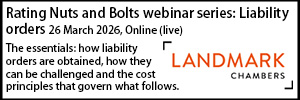High Court judge refuses to ministerial bid to stay judicial review claims over Leasehold and Freehold Reform Act 2024
- Details
The High Court has refused an application by the Secretary of State for Housing, Communities and Local Government to stay three judicial review claims challenging various provisions of the Leasehold and Freehold Reform Act 2024.
In Abacus Land 1 (Holdco 1) Limited and Others & Ors v Secretary of State for Housing, Communities and Local Government [2024] EWHC 2753 (Admin), Mr Justice Chamberlain concluded: “the balance of convenience seems to me to favour allowing the Unstayed Claims to proceed, at least to the stage of determining whether permission to apply for judicial review should be given.”
The Leasehold and Freehold Reform Act 2024 received Royal Assent in May 2024, shortly before the general election. The reforms are not yet in force and depend on secondary legislation.
The Claimants in the Unstayed Claims were (i) The Trustees of the Portal Trust, (ii) John Lyon’s Charity, and (iii) Wallace Partnership Group Ltd and Others.
The judge said: “The claims challenge various provisions (the Enfranchisement Measures) of the Leasehold and Freehold Reform Act 2024, as contrary to their rights under Article 1 of Protocol 1 to the European Convention on Human Rights (ECHR), in that they amount to an expropriation of the value of their property without any or any adequate compensation.”
A further four judicial review claims had also been brought but had been stayed by orders of the Court (“the Stayed Claims”).
A stay imposes a halt on court proceedings, apart from taking any steps allowed by the court rules or by the terms of the stay.
Two issues arose for consideration at the hearing: first, whether the Secretary of State’s applications to stay the Unstayed Claims should be granted; and second (assuming that the applications were refused), whether the stays imposed in the Stayed Claims should be lifted so that those cases can proceed.
Outlining the submissions of the parties, Mr Justice Chamberlain said counsel for the Secretary of State “expressly disavowed” any argument that the court lacked jurisdiction to hear a challenge to provisions that had received Royal Assent but not been commenced.
She submitted, however, that on the facts of the present case, the Court should exercise its “procedural discretion” to stay the Unstayed Claims in the interests of sound case management.
Counsel for the claimants in the Unstayed Claims all submitted that the Enfranchisement Measures were having real effects on them already and that they should not have to endure those effects for an indefinite period. There was no proper basis for a stay.
The application was refused and the stays which had been agreed were lifted.
Mr Justice Chamberlain said: “I accept that, if the challenges proceed before decisions about deferment and capitalisation rates have been made, there will be a risk of the court having to hear two separate challenges, one to the 2024 Act and a second to the commencement provisions, when it could otherwise hear all challenges to the legislative regime in one go. But in deciding whether to grant a stay, the balance of convenience must be considered.”
He continued: “The balance of convenience seems to me to favour allowing the Unstayed Claims to proceed, at least to the stage of determining whether permission to apply for judicial review should be given. I have accordingly given directions leading to a permission hearing in the first week of the Hilary Term. At that hearing, the Court will hear argument on the arguability of the claims as pleaded.”
He concluded: “The Secretary of State’s application to stay the Unstayed Claims is refused. It was common ground that, if the application failed, I should lift the stays in respect of the Stayed Claims. I accordingly lift those stays.”
Lottie Winson
Sponsored articles
Unlocking legal talent
Walker Morris supports Tower Hamlets Council in first known Remediation Contribution Order application issued by local authority
Senior Solicitor - Property
Legal Officer
Legal Director - Government and Public Sector
Locums
Poll















































